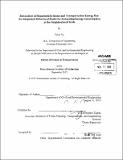| dc.contributor.advisor | P. Christopher Zegras. | en_US |
| dc.contributor.author | Yu, Feifei, S.M. Massachusetts Institute of Technology | en_US |
| dc.contributor.other | Massachusetts Institute of Technology. Department of Civil and Environmental Engineering. | en_US |
| dc.date.accessioned | 2014-03-19T15:47:12Z | |
| dc.date.available | 2014-03-19T15:47:12Z | |
| dc.date.copyright | 2013 | en_US |
| dc.date.issued | 2013 | en_US |
| dc.identifier.uri | http://hdl.handle.net/1721.1/85814 | |
| dc.description | Thesis: S.M. in Transportation, Massachusetts Institute of Technology, Department of Civil and Environmental Engineering, 2013. | en_US |
| dc.description | Cataloged from PDF version of thesis. | en_US |
| dc.description | Includes bibliographical references (pages 101-109). | en_US |
| dc.description.abstract | Household in-home activities and out-of-home transportation are two major sources of urban energy consumption. In light of China's rapid urbanization and income growth, changing lifestyles and consumer patterns - evident in increased ownership of appliances and motor vehicles - will have a large impact on residential energy use in the future. The pattern of growth of Chinese cities may also play an intertwined role in influencing and being influenced by consumption patterns and, thus energy use. Nonetheless, models for evaluating energy demand often neglect the evolution of appliance & vehicle ownership and directly correlate consumption with static characteristics without explicit behavioral links. In this thesis I aim to provide a comprehensive method for understanding household energy behavior over time. Using household survey data and neighborhood form characteristics from Jinan, a mid-sized Chinese city, I explore the relationship between neighborhood design and household-level behaviors and their impact on final energy consumption. My ultimate goal is to provide the modeling engine for the "Energy Proforma©" a tool intended to help developers, designers, and policy-makers implement more energy-efficient neighborhoods. To predict in-home and transportation energy use, and their trade-offs, I develop an integrated household-level micro-simulation framework. The simulation tool is based on a total of eight inter-related behavioral models which estimate out-of-home energy use by predicting trip generation, mode choice and trip length for each household and in-home energy use according to different energy sources. In the various sub-models, relevant dimensions of neighborhood form and design are included as explanatory variables. These models are then combined with modules that update household demographics, appliance & vehicle ownership information, and activity trade-off patterns. These inter-linked models can then be used to estimate the long-term effects of neighborhood design on household energy consumption and greenhouse gas emissions. Unlike separate in-home or out-of-home energy demand models, I develop an integrated simulation framework for forecasting. It captures estimated trade-off effects between in-home and transportation energy-consuming behaviors. The approach produces indicators of detailed behavioral outcomes such as trip mode and trip length choice, making it easier to relate policies, such as mode-oriented strategies, to ultimate outcomes of interest. I ultimately aim to provide urban designers, developers, and policy makers a decision support tool to explore and compare long-term energy performance across proposed neighborhood development projects. | en_US |
| dc.description.statementofresponsibility | by Feifei Yu. | en_US |
| dc.format.extent | 113 pages | en_US |
| dc.language.iso | eng | en_US |
| dc.publisher | Massachusetts Institute of Technology | en_US |
| dc.rights | M.I.T. theses are protected by copyright. They may be viewed from this source for any purpose, but reproduction or distribution in any format is prohibited without written permission. See provided URL for inquiries about permission. | en_US |
| dc.rights.uri | http://dspace.mit.edu/handle/1721.1/7582 | en_US |
| dc.subject | Civil and Environmental Engineering. | en_US |
| dc.title | Simulation of household in-home and transportation energy use : an integrated behavioral model for estimating energy consumption at the neighborhood scale | en_US |
| dc.type | Thesis | en_US |
| dc.description.degree | S.M. in Transportation | en_US |
| dc.contributor.department | Massachusetts Institute of Technology. Department of Civil and Environmental Engineering | |
| dc.identifier.oclc | 872125515 | en_US |
